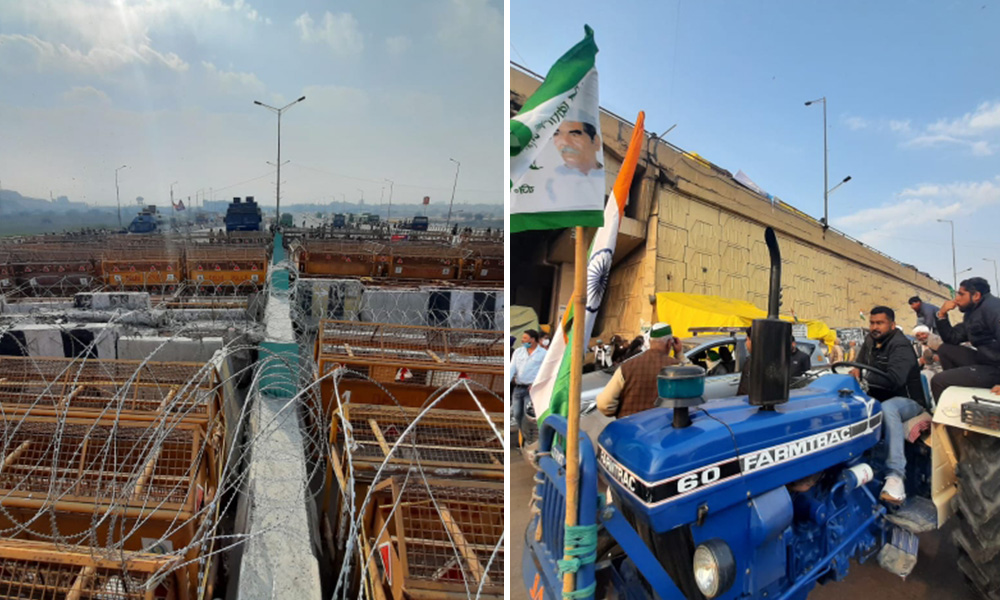
Image Credit: Deep Prakash
Protesters Including Women Forced To Defecate In Open As Barricades Cut Access To Toilets, Say Farmers
Writer: Navya Singh
Navya writes and speaks about matters that often do not come out or doesn’t see daylight. Defense and economy of the country is of special interest to her and a lot of her content revolves around that.
Delhi, 4 Feb 2021 3:37 AM GMT | Updated 4 Feb 2021 3:43 AM GMT
Editor : Shweta Kothari |
A broadcast turned digital journalist, Shweta Kothari heads the newsroom at The Logical Indian. She has previously worked with CNBC and NewsX as a news anchor and senior correspondent. Shweta holds a masters degree in journalism from the university of Sussex, UK and started her career with work placement with BBC in Scotland.
Creatives : Rajath
A free spirit who find meaning in life with the virtue of creativity and doing job par its excellence, animal lover and traveller by heart.
The protest sites that earlier resembled a 'mini pind' with a make-shift Gurudwara, langar and other amenities now resemble a 'conflict zone' with walls, barricades and heavy security deployment.
The epicentres of farmers protest have now turned into fortresses with the Delhi police installing a four-to-five-feet wide concrete wall across the Delhi-Chandigarh national highway. Behind the gigantic walls are five layers of barricades in a zone of about 1.5km, cutting access to nearly two dozen mobile toilet vans and water supply.
The heavy security deployment and barricading have cut off the protesting farmers from the national capital and stripped them of basic facilities that were available to them.
The protest sites that earlier resembled a 'mini pind' with a make-shift Gurudwara, langar and other amenities now resemble a 'conflict zone'.
Police have installed barbed wires, cement fencing, iron nails to curb the movement of protesters. The Delhi-Uttar Pradesh border at Ghazipur resembles a police cantonment with security personnel, including the Provincial Armed Constabulary (PAC) and Rapid Action Force (RAF), deployed on spot.
These barriers have affected access to basic facilities and amenities for farmers who are finding it difficult to wash clothes or perform daily chores without the availability of water.
"Every day we would wash at least 100 people's clothes but for the past few days, we have been washing clothes of about 10 people only. We don't have running water supply anymore and power cuts have become a daily affair," a volunteer who had installed washing machines at the protest site told India Today.
As the police have cut access to toilets, many have started defecating in the open. Women protesters are forced to walk kilometres to find a safe place or have to go to nearby fields.
"We are finding it difficult to access toilets and have to go to fields in the dark. Most toilets that we used to use don't have any water supply. It has become a problem for us," an elderly woman protestor from Haryana said.
Farmers have said that the government is using pressure tactics to weaken their protest. They are, however, confident that their protests will not die down.
"We are farmers. We will bore tubewells if the need arises..The government should not think that it will intimidate tus. We will not go back to our villages without securing the future of our children," said Kuljit Singh, a farmer from Patiala.
"We feel the Modi government has failed and they are scared. They have also shut down internet services and now they are cutting power and water supply. They aren't going to succeed. We will keep protesting," said Harvinder Singh Bindu, a farmer from Punjab.
Also Read: Remove Content With 'Farmer Genocide' Tag Or Face Penal Action: Government Warns Twitter
 All section
All section














